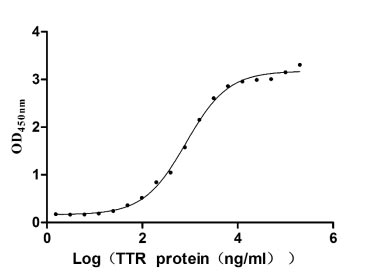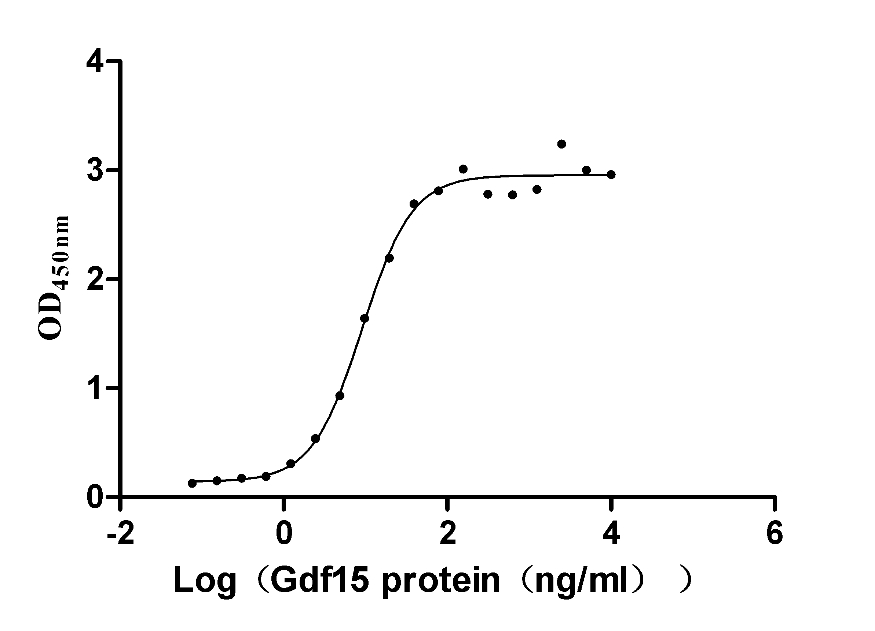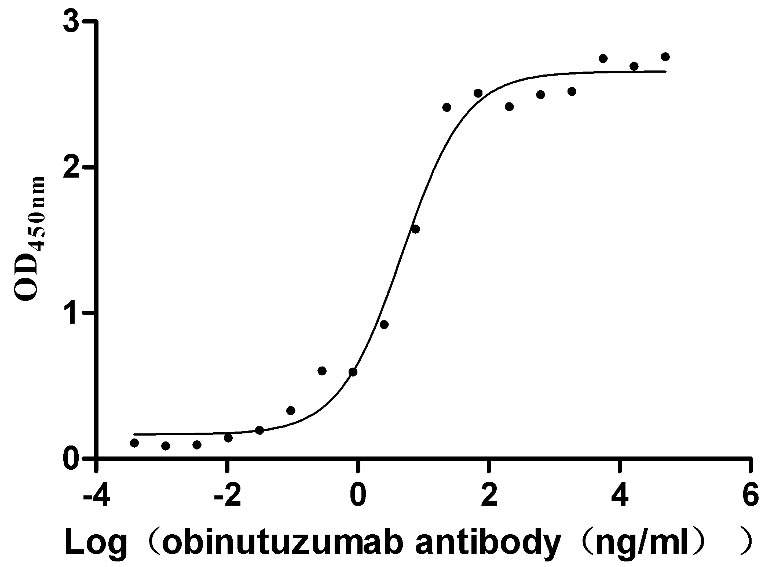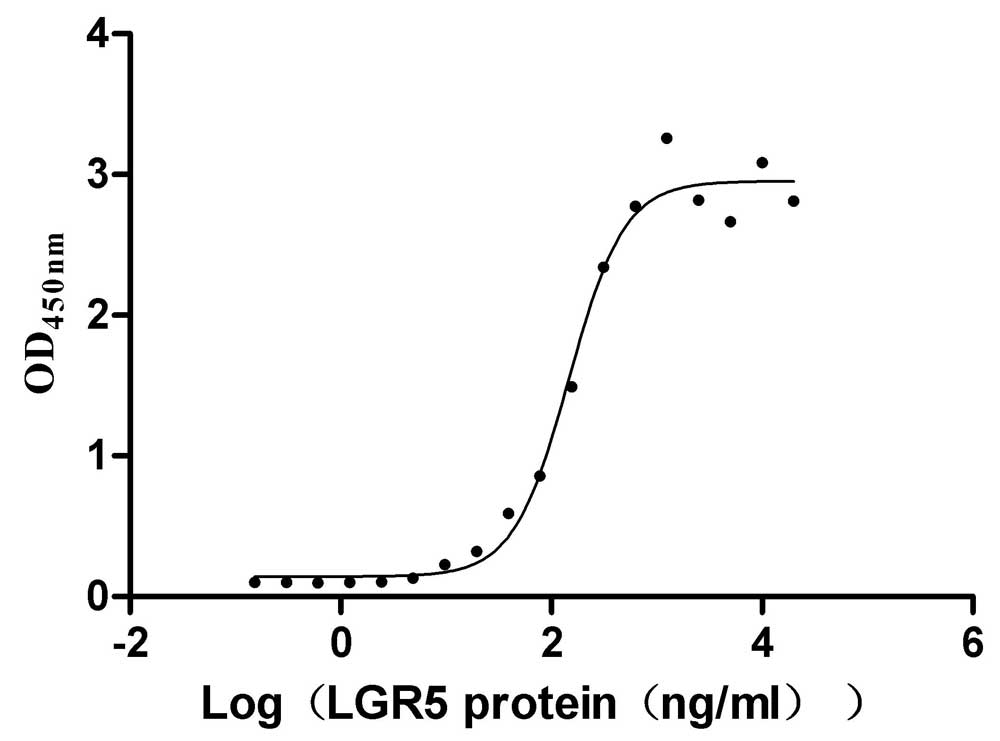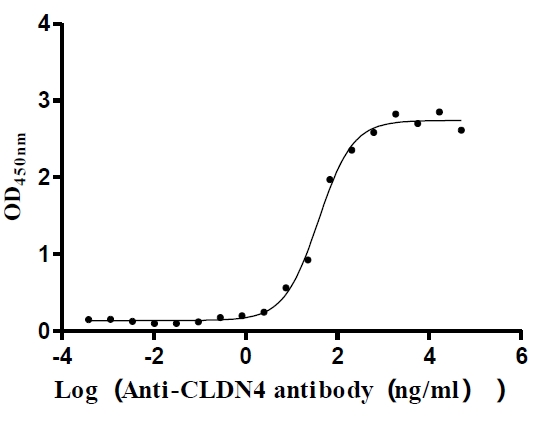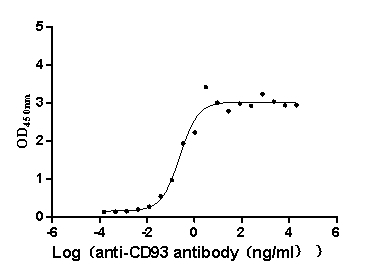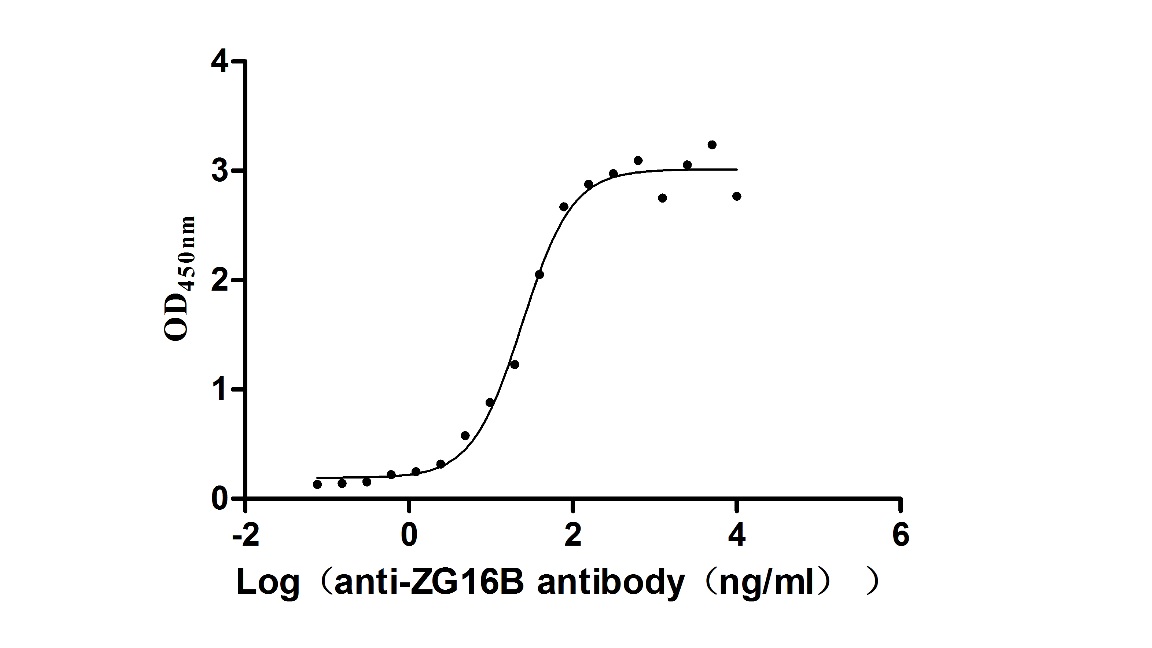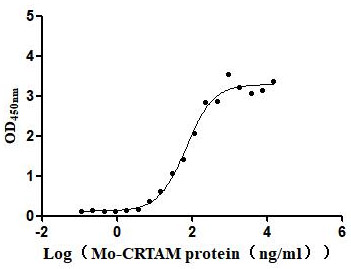Recombinant Human Interferon-induced transmembrane protein 1 (IFITM1)
-
中文名称:人IFITM1重组蛋白
-
货号:CSB-CF011024HU
-
规格:
-
来源:in vitro E.coli expression system
-
其他:
产品详情
-
基因名:
-
Uniprot No.:
-
别名:9-27; CD 225 ; CD 225 antigen; CD225; CD225 antigen; Dispanin subfamily A member 2a; DSPA2a; IFI 17; IFI17; IFITM1; IFM1_HUMAN; Interferon induced protein 17; interferon induced transmembrane protein 1 (9-27); Interferon induced transmembrane protein 1; Interferon inducible protein 9-27; Interferon-induced protein 17; Interferon-induced transmembrane protein 1; Interferon-inducible protein 9-27; Leu 13; Leu 13 antigen; Leu-13 antigen; LEU13
-
种属:Homo sapiens (Human)
-
蛋白长度:Full length protein
-
表达区域:1-125
-
氨基酸序列MHKEEHEVAVLGPPPSTILPRSTVINIHSETSVPDHVVWSLFNTLFLNWCCLGFIAFAYS VKSRDRKMVGDVTGAQAYASTAKCLNIWALILGILMTIGFILLLVFGSVTVYHIMLQIIQ EKRGY
Note: The complete sequence including tag sequence, target protein sequence and linker sequence could be provided upon request. -
蛋白标签:10xHis-SUMO-tag
-
产品提供形式:Liquid or Lyophilized powder
Note: We will preferentially ship the format that we have in stock, however, if you have any special requirement for the format, please remark your requirement when placing the order, we will prepare according to your demand. -
缓冲液:Lyophilized from Tris/PBS-based buffer, 6% Trehalose, pH 8.0
-
储存条件:Store at -20°C/-80°C upon receipt, aliquoting is necessary for mutiple use. Avoid repeated freeze-thaw cycles.
-
保质期:The shelf life is related to many factors, storage state, buffer ingredients, storage temperature and the stability of the protein itself.
Generally, the shelf life of liquid form is 6 months at -20°C/-80°C. The shelf life of lyophilized form is 12 months at -20°C/-80°C. -
货期:Basically, we can dispatch the products out in 1-3 working days after receiving your orders. Delivery time may differ from different purchasing way or location, please kindly consult your local distributors for specific delivery time.Note: All of our proteins are default shipped with normal blue ice packs, if you request to ship with dry ice, please communicate with us in advance and extra fees will be charged.
-
注意事项:Repeated freezing and thawing is not recommended. Store working aliquots at 4°C for up to one week.
-
Datasheet & COA:Please contact us to get it.
相关产品
靶点详情
-
功能:IFN-induced antiviral protein which inhibits the entry of viruses to the host cell cytoplasm, permitting endocytosis, but preventing subsequent viral fusion and release of viral contents into the cytosol. Active against multiple viruses, including influenza A virus, SARS coronaviruses (SARS-CoV and SARS-CoV-2), Marburg virus (MARV), Ebola virus (EBOV), Dengue virus (DNV), West Nile virus (WNV), human immunodeficiency virus type 1 (HIV-1) and hepatitis C virus (HCV). Can inhibit: influenza virus hemagglutinin protein-mediated viral entry, MARV and EBOV GP1,2-mediated viral entry and SARS-CoV and SARS-CoV-2 S protein-mediated viral entry. Also implicated in cell adhesion and control of cell growth and migration. Inhibits SARS-CoV-2 S protein-mediated syncytia formation. Plays a key role in the antiproliferative action of IFN-gamma either by inhibiting the ERK activation or by arresting cell growth in G1 phase in a p53-dependent manner. Acts as a positive regulator of osteoblast differentiation. In hepatocytes, IFITM proteins act in a coordinated manner to restrict HCV infection by targeting the endocytosed HCV virion for lysosomal degradation. IFITM2 and IFITM3 display anti-HCV activity that may complement the anti-HCV activity of IFITM1 by inhibiting the late stages of HCV entry, possibly in a coordinated manner by trapping the virion in the endosomal pathway and targeting it for degradation at the lysosome.
-
基因功能参考文献:
- Strong ifitm1 Expression in CD4 T Cells in HIV Controllers Is Correlated With Immune Activation PMID: 27552157
- Using a multi-group heat map from GSE9716 analysis of the GEO database, IFITM1 was determined to be a relevant radioresistance gene. Inhibition of IFITM1 in combination with radiotherapy could, indeed, inhibit oral neoplasm cells. PMID: 29770536
- Inactivated viral particle inoculation increased the expression of IFITM1protein at mRNA and protein levels, and mediated the antiviral state in HUVECs. PMID: 29100522
- Identification of three distinct mutations that converted IFITM1 or IFITM3 from inhibitors to enhancers of MERS-CoV or SARS-CoV spike protein-mediated entry revealed key structural motifs or residues determining the biological activities of IFITM proteins. PMID: 29263263
- Epithelial-mesenchymal transition (EMT) signature was dysregulated by both loss and gain of function of IFITM1, which was partially reverted by Caveolin-1 (CAV1). PMID: 27852071
- These results indicate that IFITM1 protein can restrict alphavirus infection by inhibiting viral fusion with cellular membranes. PMID: 27219333
- The transcriptional regulation of IFITM1, 2 and 3 expression. PMID: 28511927
- IFITM1 and IFITM3 inhibit Zika virus infection early in the viral life cycle. PMID: 27268505
- IFITM1 suppression blocks proliferation and invasion of aromatase inhibitor-resistant breast cancer in vivo by JAK/STAT1-mediated induction of p21. PMID: 28411130
- Compared with CD10, IFITM1 has superior performance distinguishing endometrial stroma of adenomyosis from mesenchyma surrounding invasive endometrial adenocarcinoma. PMID: 27124937
- Overexpression of IFITM1 is associated with Oral Squamous Cell Carcinomas. PMID: 27221933
- High expression of IFITM1 is associated with poor prognosis of colorectal cancer. PMID: 26884876
- These findings indicate that overexpression of IFITM1 enhances the aggressive phenotype of triple-negative SUM149 IBC cells and that this effect is dependent on STAT2/BRG1 interaction. PMID: 26897526
- propose that the IFITM proteins act in a coordinated manner to restrict HCV infection by targeting the endocytosed HCV virion for lysosomal degradation and demonstrate that the actions of the IFITM proteins are indeed virus and cell-type specific PMID: 26354436
- the importance of the C-terminal region of IFITM1 in modulating the antiviral function through controlling protein subcellular localization. PMID: 25738301
- Suggest that IFITM1 promotes the aggressiveness of colorectal cancer cells via caveolin-1 signaling. PMID: 26259513
- In virus-producing cells, IFITMs coalesce with forming virions and are incorporated into HIV-1 viral particles. PMID: 25422070
- Incorporation of IFITM1, IFITM2 and IFITM3 into HIV-1 virions impair viral fusion and spread. PMID: 25464829
- Host IFITM3,IFITM2 and IFITM1 facilitate morphogenesis of the human cytomegalovirus assembly. PMID: 25552713
- Schizophrenia subjects with higher IFITM mRNA levels in cortical blood vessels have greater disturbances in cortical GABA neurons suggests that these cell-type disturbances might be influenced by a shared upstream insult that involves immune activation. PMID: 24209773
- IFITM1 could be a novel metastasis-promoting gene that enhances the metastatic phenotype in ovarian cancer via epigenetic transcriptional regulation. PMID: 24676393
- IFITM1 is a potential valuable addition to immunohistochemical panels used in the diagnosis of cellular mesenchymal uterine tumors. PMID: 24072182
- Results suggest that the g.-1920G>A polymorphism in interferon inducible transmembrane protein 1 (IFITM1) may be associated with susceptibility to ulcerative colitis (UC). PMID: 24120510
- IFITM1 is essential for the formation of functional blood vessels and stabilizes EC-EC interactions during endothelial lumen formation by regulating tight junction assembly. PMID: 24603679
- Although their inhibitory activities were modest when compared to that of tetherin, IFITMs, but not tetherin, directly reduced the expression of HIV-1 proteins including Gag, Vif and Nef. PMID: 23376165
- s show that interferon-induced transmembrane protein 1 (IFITM-1), IFITM-2, and IFITM-3 exhibit a broad spectrum of antiviral activity against several members of the Bunyaviridae family. PMID: 23720721
- This study defines IFITM1 as an interferon-stimulated gene effector with action against HCV entry. PMID: 22996292
- IFITM1 knockdown in human alveolar-derived bone marrow stromal cells was associated with inhibition of Runx2 mRNA and protein expression. PMID: 22634173
- Introduction of anti-miR-130a in hepatocytes increased IFITM1 expression. Hepatocytes stably expressing IFITM1 reduced HCV replication. Together, these results suggested that HCV infection of hepatocytes upregulates miR-130a. PMID: 22787204
- The results suggest that the expression of IFITM1 controls the invasiveness and migration of gastric cancer. PMID: 22609115
- Hepatitis C virus infection suppresses the upregulation of a subset of effector molecules, including ISG56 and IFITM1. PMID: 21976647
- IFITM1 was expressed in the five human glioma cell lines, and its expressions were positively correlated with their tumorigenicity PMID: 20838853
- IFITM proteins differentially restrict the entry of a broad range of enveloped viruses, and modulate cellular tropism independently of viral receptor expression. PMID: 21253575
- IFITM1, IFITM2, and IFITM3 inhibit HIV-1 replication through interfering with virus entry. PMID: 21177806
- Data show that ULBP1, TFR2 and IFITM1 were associated with increased susceptibility to Vgamma9Vdelta2 T-cell cytotoxicity. PMID: 20220060
- Activated IFITM1 is associated with Peutz-Jeghers syndrome polyps. PMID: 20428811
- Down regulation of IFITM1 is associated with cervical squamous cell carcinoma. PMID: 20099975
- The positive expression level of IFITM1 is associated with the progression of the carcinogenetic process in Peutz-Jeghers syndrome. PMID: 19304549
- LEU13 has a novel role different from that in the inhibition of cell proliferation, involved in IFNA-induced refractoriness of RSa cells to X rays PMID: 12926988
- IFITM1 expression profiling could be used for molecular classification of CML, which may also predict survival PMID: 15661263
- Overexpression of 9-27 leads to increased migration and invasiveness by suppressing natural killer cells in gastric cancer PMID: 15808405
- IFITM1 has a role in cellular sensitivity to CDDP in esophageal cancer PMID: 18202764
- IFITM1 plays an important role for the invasion at the early stage of HNSCC progression PMID: 18829488
- results revealed that the interaction between IFITM1 and CAV-1 could enhance the inhibitory effect of CAV-1 on ERK activation PMID: 19499152
- Antiviral effect of IFITM family members on H1N1 influenza, West Nile virus, and Dengue virus PMID: 20064371
显示更多
收起更多
-
亚细胞定位:Cell membrane; Single-pass membrane protein. Lysosome membrane.
-
蛋白家族:CD225/Dispanin family
-
组织特异性:Bone (at protein level). Levels greatly elevated in colon cancer, cervical cancer, esophageal cancer and ovarian cancer. Expressed in glioma cell lines.
-
数据库链接:
HGNC: 5412
OMIM: 604456
KEGG: hsa:8519
STRING: 9606.ENSP00000330825
UniGene: Hs.458414
Most popular with customers
-
Recombinant Human Retinol-binding protein 4 (RBP4) (Active)
Express system: Mammalian cell
Species: Homo sapiens (Human)
-
Recombinant Mouse GDNF family receptor alpha-like (Gfral), partial (Active)
Express system: Mammalian cell
Species: Mus musculus (Mouse)
-
Recombinant Human B-lymphocyte antigen CD20 (MS4A1)-VLPs (Active)
Express system: Mammalian cell
Species: Homo sapiens (Human)
-
Recombinant Human R-spondin-1 (RSPO1), partial (Active)
Express system: Mammalian cell
Species: Homo sapiens (Human)
-
Recombinant Human Claudin-4 (CLDN4)-VLPs (Active)
Express system: Mammalian cell
Species: Homo sapiens (Human)
-
Recombinant Macaca fascicularis CD93 molecule (CD93), partial (Active)
Express system: Mammalian cell
Species: Macaca fascicularis (Crab-eating macaque) (Cynomolgus monkey)
-
Recombinant Macaca fascicularis zymogen granule protein 16 homolog B (ZG16B) (Active)
Express system: Mammalian cell
Species: Macaca fascicularis (Crab-eating macaque) (Cynomolgus monkey)
-
Recombinant Mouse Cell adhesion molecule 1 (Cadm1), partial (Active)
Express system: Mammalian cell
Species: Mus musculus (Mouse)


